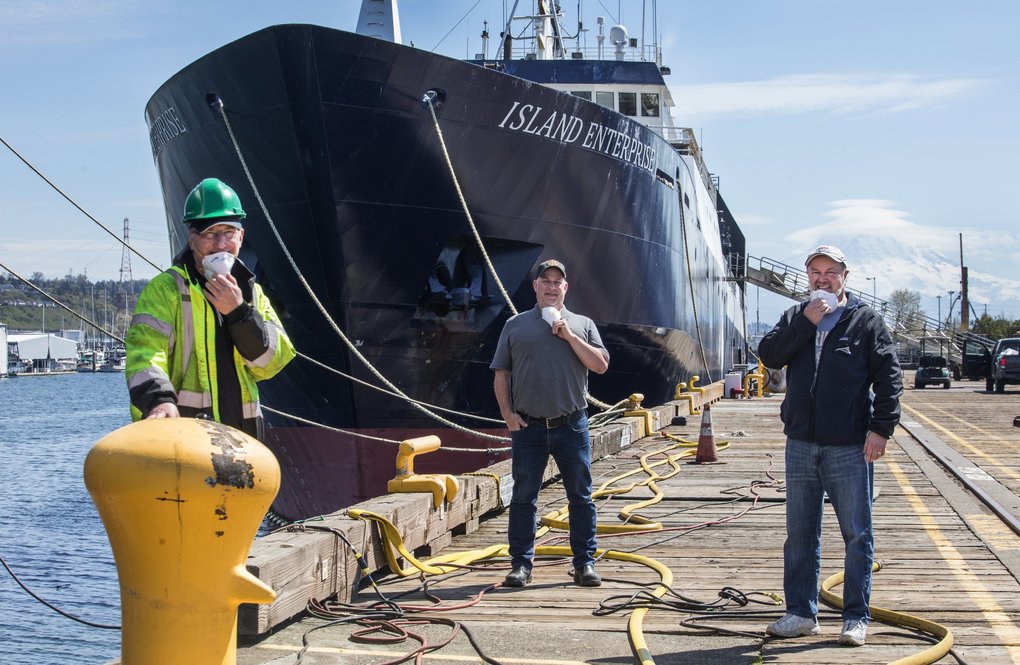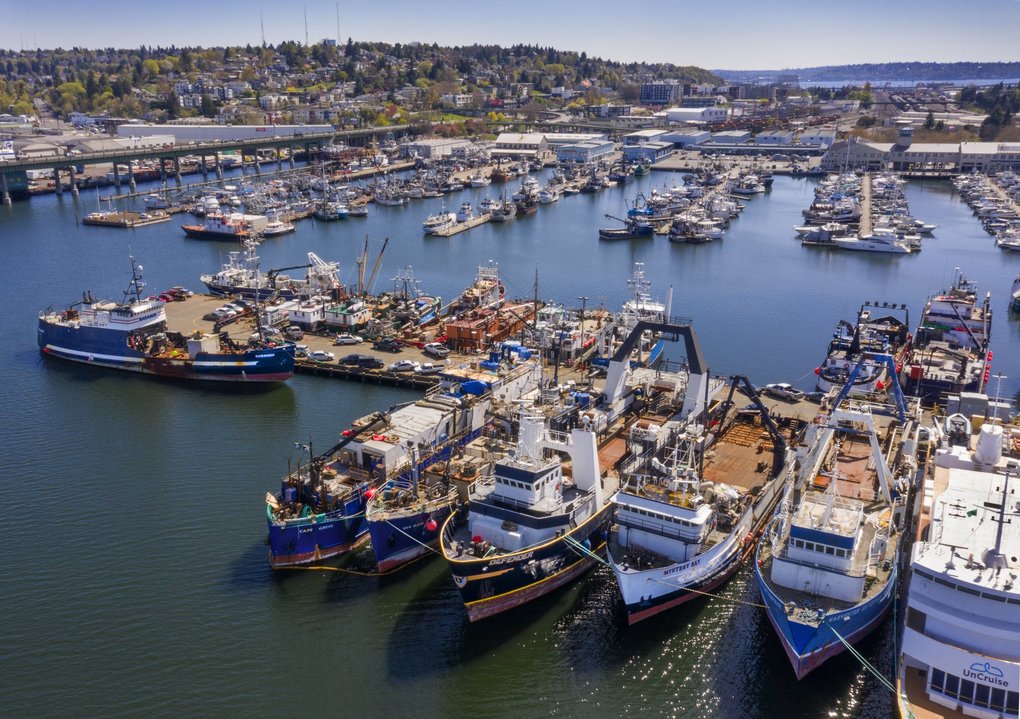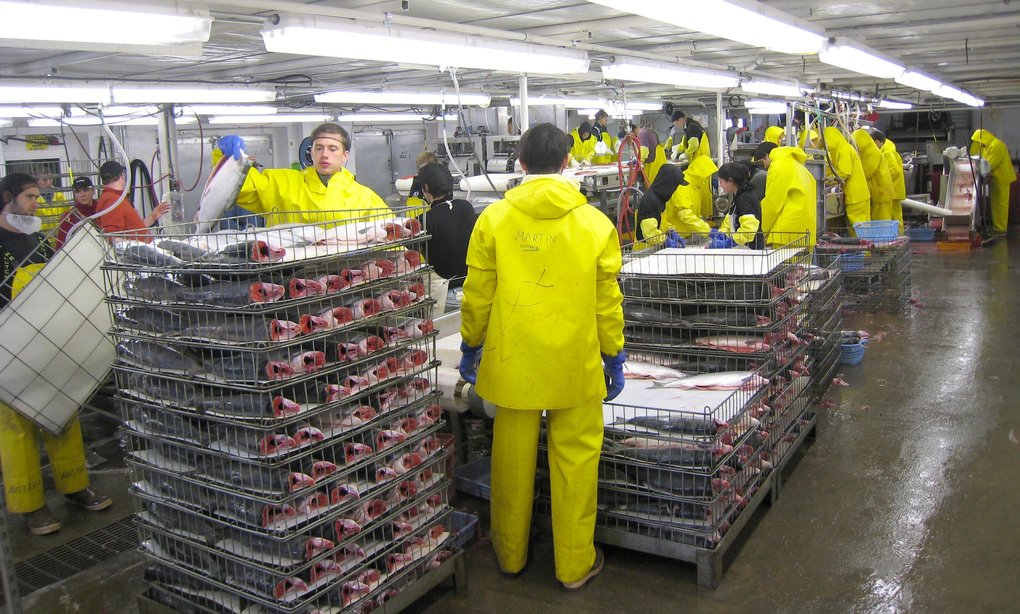
阿拉斯加捕魚季節來臨,當地社區的擔憂及海產公司預防新冠肺炎
April 21, 2020
西雅圖時報 記者 Hal Bernton訪問三叉海產公司(Trident Seafoods)報導:
TOCOMA - 下個月初,三叉海產公司( Trident Seafoods) 的漁船作業經理 Tod Hall將和他太太說再見離開他 Lakewood 家,然後開始六個月的海上捕魚及捕魚後於華盛頓州及阿拉斯加州的後續魚加工作業。
但是今年他不能馬上登上停泊於 Tacoma 碼頭等著所有船員要上的三叉海產公司(Trident Seafoods)其中一艘 316 英呎長,船名為 Island Enterprise 的船,反而必須先報到住進西雅圖外圍的旅館。
接下來必須留在旅館房間內接受 14 天隔離檢疫不能走出房門一步,一天中所有三餐都必須由旅館服務人員送到房門口,而且也不能在房間外面溜躂。
Hall 將是 三叉海產公司( Trident Seafoods )大約4000 名左右 在西雅圖及阿拉斯加州旅館中接受 14 天隔離檢疫的岸邊加工廠短期聘僱工作人員及海上船員的其中一名。
這段隔離禁閉時期,人員將受到安全警衛的監督,護士 每天都要量體溫 。而且船公司在完成足夠海上補給出發兩天前,所有上船人員還必須再檢測一次確認沒有任何人有病毒感染。
這個處理方式似乎是所有捕魚公司額外的時間耗損,也是阿拉斯加捕魚季額外的耗損時間,這也等於耗損及影响 佔美國 每年半數以上近海及遠洋漁業捕撈漁貨的作業時間。
三叉海產公司 ( Trident Seafoods) 及其他海鮮公司的管理階層也都希望確定這些海上拖網漁船在遠方白令海峽作業時不會遇到那些發生在今年很多遊輪船上的恐佈劇情,造成很多船上人員一波波被感染的不幸事件。
Hall 敍述說,只要有任何一次的類似小插曲,就會毁掉整個捕魚季節所以船上不能有任何病毒存在。
這些海鮮公司在岸上的鮭魚作業加工廠也怕可能面臨另一個可能令人氣餒的挑戰 。阿拉斯加在百年以前曾經遭到大流行性感冒的衝擊造成當地公司巨大的損失,所以也怕萬一到時幾千人的臨時工人中會有人傳播病毒到當地社區。
Bristol Bay 地區是全球最大的 紅鮭魚產地,當地有些人希望能取消這次夏季捕魚季節,以避免遇到這波疫情,因為阿拉斯加西南地區是美國目前唯一未發生疫情的地區。
印地安 Curyung 部落酋長 Tom Tilden 和 Dillingham 市長 Alice Ruby 在4月6號寫信給阿拉斯加州長 Mike Dunleavy 希望能関閉 Bristol Bay 鮭魚捕魚區,因擔心會有潛在危險,如果發生疫情將會毁滅我們整個社區,所以不值得去冒險。
但州長 Dunleavy 已委任這些海鮮公司的主要管理人士並支持在 Bristol Bay 及阿拉斯加其他地區 繼續 鮭魚的捕撈作業。
州長發言人給 西雅圖時報的書面聲明說已經和這些捕魚公司及當地政府相關人員一起努力的去做一些相關防護措施及在附近社區內做一些必要安全措施。
困難的關鍵時刻 :
在這段春季肺炎疫情期間 ,三叉( Trident Seafoods )海產公司總裁 Joe Bundrant 和其他海鮮公司們的主管人員已經和醫療顧問為即將到來的捕魚作業規畫出人員檢疫程序及一些相關衛生規範準則。
Trident Seafoods ( 三叉海產公司)是私人擁有的公司,總部設在西雅圖,是 Joe 的父親 Chuck Bundrant 創辦設立的海產公司,目前是屬於北美洲幾個最大海產公司之一,擁有40條捕魚船的船隊及 16 家美國的海產加工廠遍佈從 Akutan ,阿拉斯加阿留申群島 到 Carrollton,喬治亞州。
Joe Bundrant 目前承受公司成立47年來從未有過的挑戰,在此關鍵時刻必須 承擔應付目前因疫情關係造成全美餐館業及相關食品服務行業的沉重打擊,又加上阿拉斯加當地人民的反對捕魚聲浪 。
Joe 說這時候隔離檢疫措施雖然將造成公司幾百萬美元的額外開銷,但對於整個公司財務因這次疫情於夏季捕魚季中所造成的財務損失打擊僅能算是滄海一粟 !
目前我們最首要的任務是能確保我們人員安全-我們的社區,我們的員工及我們所有漁船工作人員。Joe 在報社記者訪問時表示,我們是屬於美國政府委託負責 的民生必需產業提供人民需要的食物,所以我們會盡我們的能力完成使命。
因為其他48 州,因疫情感染食品行業而造成的嚴重社會經濟衝擊已經顯現出來了。
以下原文:
As Alaska Fishing Season Set to Begin, Fearful Communities and Seafood Industry Try to Prevent Spread of Coronavirus
April 17, 2020 at 6:00 am│Updated April 21, 2020 at 12:17 am

Tod Hall, left, Trident Seafoods’ manager of vessel operations; Roger Lebel, purser of Trident ship Island Enterprise; and Mike Luchino, director of operations for Trident’s catchers and processors group, gather at the Tacoma pier, where commercial fishery ships are being prepared for the new season in Alaska. (Steve Ringman / The Seattle Times)

TACOMA — Early next month, Trident Seafoods vessel-operations manager Tod Hall will bid his wife goodbye, then leave his Lakewood home for the start of a six-month season catching and processing fish off Washington and Alaska. This year, instead of boarding the 316-foot Island Enterprise now moored at a Tacoma dock, he first will check into a hotel on the outskirts of Seattle. For the next 14 days, he will remain quarantined in his room with all meals delivered and even an occasional hallway stroll off-limits.
Hall will be one of the first of some 4,000 Trident shoreside processing workers and at-sea crew to undergo this two-week quarantine in Seattle-area and Alaska hotel rooms. Their confinement will be monitored by security guards and nurses who will do daily temperature checks. Two days before they exit, if Trident can secure enough supplies, they will be tested for COVID-19, the illness caused by the coronavirus.
Such measures might seem extraordinary, but these are extraordinary times for Alaska’s seafood industry, which each year delivers more than half of the U.S. harvest from coastal and offshore waters.
Trident and other seafood-company officials hope to ensure that factory trawlers making their way through remote swaths of the Bering Sea do not replay any of the harrowing scenarios that unfolded on cruise ships this year, when waves of the virus sickened passengers.
“The chance of having one hiccup — it’s going to ruin the season for everyone,” Hall said. “The boat has to be virus free.”
Processors face another daunting challenge in launching salmon operations in remote Alaska communities, many of which suffered losses in the flu pandemic of more than a century ago and are fearful of thousands of seasonal workers spreading COVID-19. In the Bristol Bay region, which hosts the largest sockeye salmon runs on the planet, some have called for the summer season to be canceled to stave off the coronavirus pandemic that so far has yet to make its way to this Southwest Alaska region.
“We don’t want this fishery to happen,” said First Chief Tom Tilden of the Curyung Tribe, who co-signed along with Dillingham Mayor Alice Ruby an April 6 letter to Alaska Gov. Mike Dunleavy requesting he consider a Bristol Bay salmon closure. “The potential for devastating communities is there. And to us, it’s not worth the risk.”
Dunleavy has designated fishermen part of Alaska’s essential workforce and, so far, has supported continuing salmon harvests in Bristol Bay and other parts of the state.
“The state is actively working with the fishing industry and local government on protecting fishery workers and surrounding communities,” Jeff Turner, a Dunleavy spokesperson, said in a statement to The Seattle Times.

Commercial fishing boats are a familiar sight at Fishermen’s Terminal in Interbay. Even this industry has not been immune to coronavirus fears and safety measures. (Steve Ringman / The Seattle Times)
A difficult juncture
Through the spring pandemic, Trident CEO Joe Bundrant, along with other industry officials, has been working with health consultants to develop the quarantine procedures as well as other protocols for the upcoming seasons.
Bundrant leads the privately held, Seattle-based company founded by his father, Chuck Bundrant, that now ranks as one of the largest seafood companies in North America with a fleet of some 40 vessels and 16 U.S. processing plants that stretch from Akutan, in Alaska’s Aleutian Islands, to Carrollton, Georgia.
Joe Bundrant faces one of the most difficult junctures in Trident’s 47-year history as he charts a course through a pandemic that has imploded sales to major restaurant and food-service customers and generated strong opposition to summer operations among some Alaskans.
Bundrant said pandemic precautions will cost millions of dollars. Those additional expenses would be a “drop in the bucket” compared to the financial blow from a major COVID-19 outbreak in the middle of the summer season.
“Our No. 1 priority, beyond anything else in the world, is keeping people safe. Our communities, our employees and our fishermen,” Bundrant said in an interview. “We have been designated by the U.S. government as an essential business to provide food, and we are doing everything in our power to do that.”
In the Lower 48, the risks of coronavirus spreading through the food-processing industry already have been starkly demonstrated.
In South Dakota, the Smithfield Foods pork plant suspended operations this month after being linked to more than 640 cases.
In Washington, Benton Franklin Health District has tied 51 COVID-19 cases as of Thursday to a Tyson Foods meat-packing plant near Pasco.
Cramped conditions
Trident Seafoods, which operates processing plants in Anacortes and Bellingham, reports four employees have tested positive for COVID-19 at the plants and two others at the Seattle office. Five of the six have recovered and another is doing well at home, according to Bundrant, who said employees have their temperatures taken daily to check for fever and that cleaning and other preventive measures have been put in place at the plants.
Should coronavirus find a way on board a Trident factory ship, an outbreak would be much more difficult to control.
On the Island Enterprise, more than 120 crew work 16-hour shifts, many in the cramped conditions of processing lines where up to 350 metric tons a day of pollock are turned into frozen fillet blocks for products like fish sticks and surimi, which is used in simulated seafood.
They dine in close quarters, and sleep in bunks with scant opportunity for social distancing.
During the winter season, which began in January, the crew of the Island Enterprise, as well as those aboard two Trident sister ships, worked in a kind of splendid isolation. They flew to Alaska in early January, before the onset of the coronavirus, and by early March — to keep the virus at bay — Trident had banned any crew excursions during brief port stops at Dutch Harbor in the Aleutian Islands.
“It was a total lockdown until the product was off the boat and the crew was separated” in Tacoma, Hall, the ship’s operations manager, recalled.
In the weeks ahead, the crews returning for the summer season will have to agree to similar restrictions. Anyone who leaves a hotel room during the two-week quarantine won’t make it onto the ship. And anyone who leaves the ship before a season’s end won’t be able to get back on board, according to Trident officials.
“It’s a bitter pill, but the pill will hopefully make you immune,” said Mike Luchino, who is Trident’s operations director for the vessels that catch and process pollock.
Protecting towns and villages
The coronavirus also could quickly spread through Alaska shoreside processing plants, where workers often are lodged in bunkhouses and eat in dining halls. Even in a typical season, influenza and other infectious diseases can be serious problems.
“Seafood-production facilities are a petri dish. We fight health issues all the time,” said Norm Van Vactor, chief executive officer of Bristol Bay Economic Development Corp., a Dillingham, Alaska-based group formed by congressional legislation to invest revenues from the seafood industry in native communities of southwest Alaska.

During the Bristol Bay summer season fishery, a crew processes sockeye salmon. Residents of that region are worried that fishers and processors will spread the novel coronavirus in their communities. (Courtesy of Jim Smith )
Bundrant said the company will try to keep COVID-19 out of Trident’s Alaska processing plants by putting all hires through the hotel quarantines and swab testing, then creating closed facilities where employees are not allowed to venture into nearby towns.
A COVID-19 prevention plan for the summer salmon harvest also must involve thousands of independent fishermen, many from West Coast states where the virus is widespread, who catch and deliver the fish to processing plants.
Bundrant is hoping the salmon fishermen will follow Trident’s lead, and go through two-week quarantines and stay — as much as possible — on their boats. He said Trident is arranging for merchants to deliver supplies to the docks, so the crews don’t have to go into nearby communities.
The first big test of this strategy will unfold in Cordova, a town of about 2,100 on the east side of Prince William Sound where Trident operates a processing plant. Some 400 fishermen are expected there to participate in a mid-May opening for Copper River sockeye and king salmon.
Alaska has more than 29o confirmed COVID-19 cases. But Cordova, which has no road access, currently has no confirmed cases, and there has been plenty of debate in recent weeks about the upcoming harvests.
Cordova Mayor Clay Koplin supports proceeding with the Copper River fishery, rather than shutting down the harvest in what he said would be an economic disaster for the town. He said the fishermen will be expected to go through a 14-day quarantine, and that bathrooms and showers will be available at a community indoor swimming pool now closed due to the coronavirus.
“We are putting a priority on the lives of our citizens but looking to have as functional a fishery as possible,” Koplin said. “We are trying to strike a balance.”
Sylvia Lange, a lifelong resident of Cordova and former gillnetter, gives credit to Trident’s efforts to block the spread of the virus. But she says the chances of the virus taking hold in Cordova are just too great as the town swells with an influx of fishermen and processors. She thinks the harvest should be shut down, or just restricted to local fishermen, even if that means the hotel she now operates remains empty all through the fishing season.
“I personally can’t put a money value on my loved ones, and I’m willing to go bankrupt rather than put them at risk,” Lange said.
Millions at stake
Alaska’s most valuable salmon fishery unfolds in the Bristol Bay region, building to an early July peak that involves some 12,000 fishermen and processors. Last year, the harvest brought in a record $306.5 million to fishermen, and was worth hundreds of millions more after processing the catch into fresh and frozen fillets and other products.
The Spanish flu pandemic of 1918 and 1919 killed many people in the Bristol Bay region. There has yet to be a confirmed case of the novel coronavirus that is currently spreading across the globe. But Dillingham Mayor Ruby and Tilden, the Curyung first chief, in their letter to Dunleavy this month, suggested shutting down the season to try to prevent a “potential mass disease situation.”
Another approach was outlined in an April 15 letter to Dunleavy signed by leaders of six southwest Alaska organizations, including the Bristol Bay Development Corp. The letter calls for mandatory coronavirus testing before fishermen fly from Anchorage to the Bristol Bay region, a 14-day quarantine, and follow-up testing as well as enforcement.
“If the fishery is allowed to go forward without these measures, ignoring the warnings of public health experts and officials and the pleas of Bristol Bay communities, the consequences will be devastating and generational,” the letter stated.
Many Bristol Bay fishermen are pledging cooperation to try to prevent the spread of the coronavirus, and are hopeful the season can safely proceed.
Still, there are plenty of skeptics. They say fishing crews will inevitably take leave of their boat, and spread the virus.
“I don’t think it’s going to work,”said Doug Karlberg, a Bellingham veteran of more than four decades of Bristol Bay fishing and processing. “You have got three to four people living in 100 square feet. You think anybody will want to get off?”
(Quoting from The Seattle Times)
